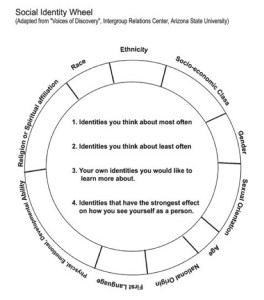Social Identify WheelSubmitted by Dr. Barbara Moore Williams
What can you do immediately to continue your journey towards cultural proficiency? ______________________________________________________________
Cultural proficiency is defined as a mind-set, a worldview, a way a person or an organization makes assumptions for effectively describing, responding to, and planning for issues that arise in diverse environments. For some people, cultural proficiency is a paradigm shift from viewing cultural differences as problematic to learning how to interact effectively with other cultures. Culturally proficient leaders display personal values and behaviors that enable them and others to engage in effective interactions among students, educators, and the communities they serve. Cultural competence is behavior that aligns with standards that move an organization or an individual toward culturally proficient interactions. Source: Cultural Proficiency:
A Manual for School Leaders, by Randall B. Lindsey, Kikanza Nuri Robins, and Raymond D. Terrell
This journey starts by looking within to examine your own biases (we all have them), beliefs and values. What parts of your cultural makeup can you articulate to others? Cultural proficiency suggests four essential elements. They are:
- Have the capacity for cultural self-assessment (your own and and the institutions you are a part of).
- Value diversity.
- Be conscious of the “dynamics” inherent when cultures interact.
- Institutionalize cultural knowledge, and adapt to diversity.
To help you process the first element, to assess cultural knowledge, take time to answer the prompts in the cells on the social identity wheel related to your life. Think about which ones stand out for you and which ones may be different in others around you. What does that mean for how you look at the world, situation, and interactions?
As you process this and discuss this with others, remember that the way you see any situation may be different than someone with another identity. Check out Janet Helm’s “White Racial Identity Development Model Two phases: abandonment of racism & defining a non-racist identity” and Beverly Tatum’s chapters on identity development in Why Are All the Black Kids sitting Together in the Cafeteria.
Click here to download a copy of the Social Identify Wheel
___________________________________________________________________________________________________________________
About the Author:
Dr. Barbara Moore Williams was born and raised in Philadelphia, PA attending public schools throughout her K-12 education. A talented pianist, she then earned a bachelor’s degree in music education from Howard University in Washington, D.C. Upon returning home she began to build a career in education in the Philadelphia School District where she served for over thirty-five years in various capacities including teacher, coach/trainer, curriculum support person, and Director of Teacher Development. One of her proudest accomplishments was the establishment of the Teaching and Learning Network, a professional development group comprised of one hundred and twenty staff developer/coaches assigned to support the development of all principals and teachers in the cluster configurations. She also designed the first Induction and mentoring program in the school district and inducted over 10,000 new teachers during her tenure.
She is currently the owner of BMW &Associates, an educational consultant company working in several school districts and charter schools in Pennsylvania and New Jersey. Her expertise is in teacher development, school leadership, coaching, new teacher development, anti-racist and diversity training, and designing and assessing effective professional development. Additionally, she has been a motivational speaker for various national groups of educators, parents and students across the country.
Her current work includes training in cultural proficiency and the influence of race in teaching and learning in several school districts in Pennsylvania and New Jersey. She has led workshops for the (former) Delaware Valley Minority Student Achievement Consortium and the Central Jersey Consortium for Excellence and Equity both are clusters of school districts focused on increasing the achievement of minorities. Additionally, she has served as an adjunct professor at Temple University in the College of Education and Cheyney University as well as delivered seminars at the University of Pennsylvania, Drexel University and Widener University.
Dr. Moore Williams also has a Master of Education degree in Elementary Education, a principal certificate, and a Doctor of Education in Educational Leadership from Saint Joseph’s University. Her dissertation focused on academic achievement of African American adolescent males in an urban high school and she continues to research anti-racist practices and equity issues.
Her motivation for continuing work in education stems from her love and devotion to the teaching profession and the search for the most effective methods to educate all children, especially those who are disenfranchised in our current educational systems.

